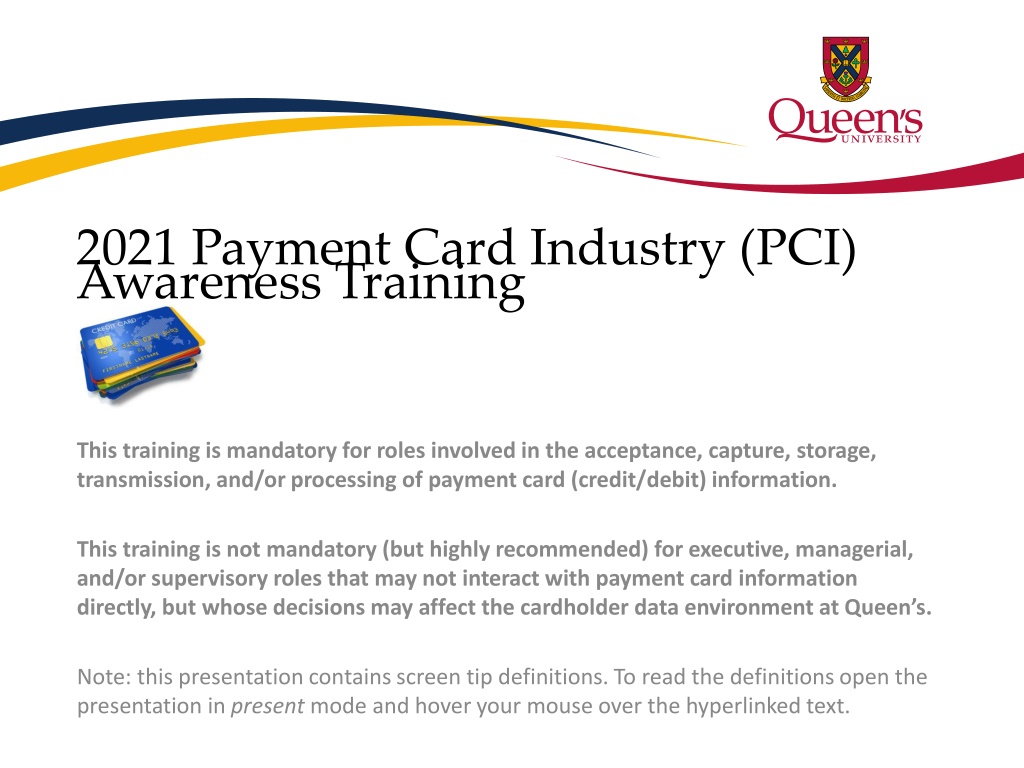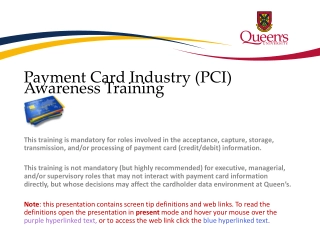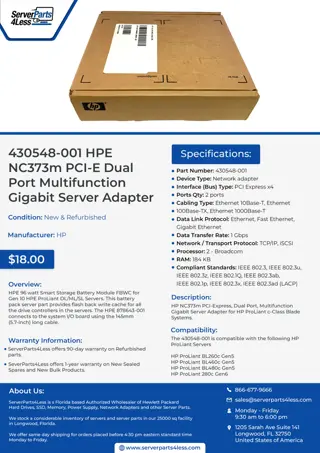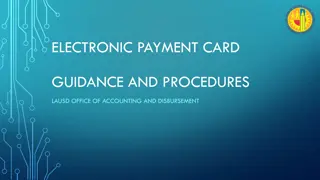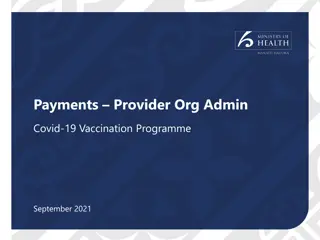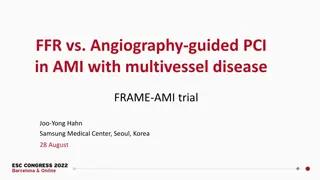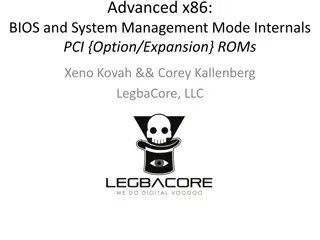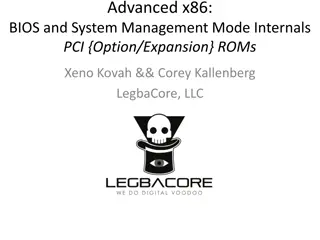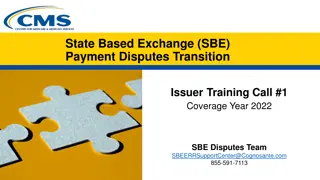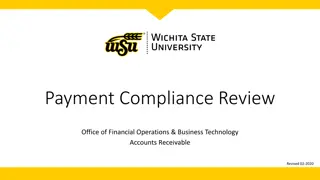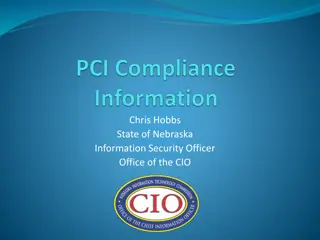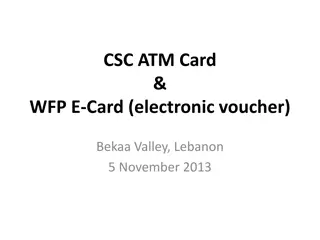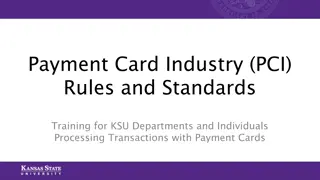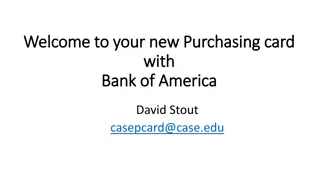Payment Card Industry (PCI) Awareness Training Overview
Payment Card Industry (PCI) Awareness Training is essential for roles handling payment card information. The training covers What is PCI, the 12 PCI DSS requirements, remote work implications, consequences of non-compliance, data protection measures, vulnerabilities, incident response, and responsibilities. Queen's is accountable for complying with PCI DSS standards, including the annual audit to ensure adherence to the requirements. The impact of COVID-19 on remote work and the necessary precautions for securely handling payment card data remotely are highlighted.
Uploaded on Aug 17, 2024 | 1 Views
Download Presentation

Please find below an Image/Link to download the presentation.
The content on the website is provided AS IS for your information and personal use only. It may not be sold, licensed, or shared on other websites without obtaining consent from the author.If you encounter any issues during the download, it is possible that the publisher has removed the file from their server.
You are allowed to download the files provided on this website for personal or commercial use, subject to the condition that they are used lawfully. All files are the property of their respective owners.
The content on the website is provided AS IS for your information and personal use only. It may not be sold, licensed, or shared on other websites without obtaining consent from the author.
E N D
Presentation Transcript
2021 Payment Card Industry (PCI) Awareness Training This training is mandatory for roles involved in the acceptance, capture, storage, transmission, and/or processing of payment card (credit/debit) information. This training is not mandatory (but highly recommended) for executive, managerial, and/or supervisory roles that may not interact with payment card information directly, but whose decisions may affect the cardholder data environment at Queen s. Note: this presentation contains screen tip definitions. To read the definitions open the presentation in present mode and hover your mouse over the hyperlinked text.
Content This training will cover the following: 1. What is PCI? 2. The 12 PCI DSS requirements 3. PCI DSS and remote work 4. Consequences of non-compliance 5. What are we protecting? 6. How to accept, store, and dispose of credit card information 7. How Queen s is vulnerable to attacks 8. Incident response 9. Your responsibilities 10. Resources
What is PCI? The Payment Card Industry (PCI) was founded in 2006 by American Express, Discover, JCB International, MasterCard & Visa Inc. to help organizations understand and implement standards for protecting cardholder data. It is currently governed by the PCI Security Standards Council. As a merchant, Queen s is responsible for complying with the PCI Data Security Standards (PCI DSS). These are 12 specific requirements that measure the security of organization s cardholder data environment (CDE).
The 12 PCI DSS Requirements Queen s is audited annually (Sep Dec) to prove that all payment streams on campus comply with the 12 PCI DSS requirements listed below:
PCI DSS and remote work COVID-19 has substantially changed the working environment and working from home has been encouraged by the government, wherever possible. Although there have been specific (PCI DSS) requirements relating to remote working for a long time, the importance of these requirements is now coming to the fore. The specific requirements in the Standard that can help remote workers are listed below: **Please note before collecting or processing credit card payments while working remotely, you MUST have prior approval from the PCI Coordinator**
PCI DSS and remote work contd. Use multi-factor authentication for all remote network access originating from outside the company s network. DO NOT write down or share passwords and remember to use a strong password. Passwords are confidential and should be protected. Ensure systems used for remote work have up-to-date patches, anti- malware protection, and firewall functionality to protect from internet- based threats. Do not ignore the updates even if you must restart your computer. Uninstall or disable applications and software that are not needed to reduce the attack surface of computers and laptops. **Please note before collecting or processing credit card payments while working remotely, you MUST have prior approval from the PCI Coordinator**
PCI DSS and remote work contd. Implement access controls to ensure that only individuals whose job requires access to the cardholder data environment (CDE) or cardholder data have access to those resources. Use only secure, encrypted communications e.g., a properly configured VPN (FortiClient) to protect all transmissions to/from the remote device that contain sensitive information, such as cardholder data. Automatically disconnect remote access sessions after a period of inactivity, to avoid idle, open connections being used for unauthorized access. Limit access to system components and cardholder data to only those individuals whose job requires such access. Remember the incident response plan and report all incidents accordingly. **Please note before collecting or processing credit card payments while working remotely, you MUST have prior approval from the PCI Coordinator**
Consequences of non-compliance As a business who processes payment cards, we are responsible for protecting the data of our customers. If we don t, some (if not all) of the following could happen: Loss of revenue and downtime for systems that are breached Fines to Queen s by the PCI and more strict PCI requirements Liability for damages Potential loss of payment card acceptance privileges
Example In 2015/16 customers who purchased food from Wendy s noticed their cards were being fraudulently used at other retailers. In an investigation it was discovered that 1,000 Wendy s locations had been compromised after malware was installed on their point-of-sale devices by a third-party vendor. The breach affected 7,500 banks and credit unions who filed a class action lawsuit against Wendy s to recover costs. In 2019 Wendy s reached a settlement with the financial institutions for $50M. Their insurance will cover not quite half of the settlement fees. https://www.scmagazine.com/home/security-news/wendys-has-agreed-to-pay-50-million-to-settle-negligence-claims-following-its-2015-2016-data-breach-that- affected-more-than-1000-of-the-burger-chains-locations/
What are we protecting? Hackers want your cardholder data. By obtaining the Primary Account Number (PAN) and sensitive authentication data, a thief can impersonate the cardholder, use the card, and steal the cardholder s identity. Take a look at the payment card diagram on the next slide. Everything at the end of a red arrow is sensitive cardholder data. Anything on the back side and CID must never be stored. You must have a good business reason for storing anything else, and that data must be protected. https://www.pcisecuritystandards.org/pci_security/why_security_matters
What are we protecting? This information can NEVER be stored https://www.pcisecuritystandards.org/pci_security/why_security_matters
Accepting payment cards electronically You must ensure the security of your electronic payment methods. This includes: - Completing inspections on PIN pad devices - Logging off of your PCI terminal - Monitoring the connection between Queen s and hosted pay pages/e-commerce - Creating strong passwords Approved Methods of Electronic Media Acceptance Student / Customer / Guest Online In person Phone* Queens Rep Payment Application E-Commerce *If wanting to process telephone payments using VOIP, wireless headsets, mouse, keyboard etc. contact PCI Coordinator prior to use to ensure PCI Compliant." PIN Pad Device PCI Terminal
Creating strong passwords The use of weak and default passwords is one of the leading causes of data breaches. https://blog.pcisecuritystandards.org/infographic-strong-passwords
Accepting written payment card info Approved Methods of Paper Media Acceptance Student / Customer / Guest You are responsible for the chain of custody for any payment card data that you write down. Custody transfer via a bonded courier is permitted. Mail* Phone** Fax*** Payment card information is never to be received via end user messaging such as voicemail, e-mail, or text message. Written on form (if necessary)* *The card verification value (also known as CVD, CVN, CVV, CVV2, CVC) is never to be written down in any form. If a customer accidentally provides this information (ex. on a mailed in application with payment card info) it must be destroyed immediately via cross cut shredding or Iron Mountain box. Queens Rep **If telephone processing involves technologies such as VOIP, wireless headsets, etc., it needs to be approved by the PCI Coordinator prior to use. PIN Pad ***Processing using a fax machine must be approved by the PCI Coordinator prior to use. PCI Terminal
Storing and disposing of paper forms Businesses are permitted to physically store a written PAN and expiration date as long as it is for less than 30 days, in a secured and locked facility, and cross shredded when no longer needed (or after the transaction has been completed). Example: storing a form in a locked filing cabinet in an office where access is controlled. The form is either cross shredded or placed in an Iron Mountain box when the transaction has completed.
How can cardholder data be stolen? From a business perspective, this information can be stolen when a customer uses their credit card to purchase goods and/or services. We (Queen s) are responsible for protecting the cardholder s information from the moment they pull out their card to make a purchase until the transaction has completed. Once the payment has been completed, security is the responsibility of the payment acquirer. https://www.pcisecuritystandards.org/pci_security/why_security_matters
How is Queens vulnerable? Point of Sale Systems: PIN Pad Devices PCI Terminals (computers hardwired into the PCI network that allow staff to key or swipe cardholder data into a computer) E-Commerce (hosted checkouts and payment gateways) Payment Applications
How is Queens vulnerable? Networks and wireless routers: Queens has a segregated PCI network used only to process credit card transactions. This is a wired network (never wireless) to reduce vulnerability. Business Processes: Any business process that does not involve the customer entering their data directly into a POS system adds additional vulnerability. Ex. Accepting a credit card number over the phone, writing it down, and processing later.
Signs of suspicious activity A secured, locked cabinet with payment card data has been broken into or looks damaged. Lost paper forms containing payment card data. Suspicious behaviour around devices A skimming device or unusual attachment on a POS device. A broken tamper proof seal on a POS device. Multiple small transactions (at the one dollar value) through an online store or e-commerce account. Multiple refunds going to the same card. Different serial numbers on the PIN pad machine indicating the device has been switched. Unfamiliar equipment surrounding your PCI terminal or POS device. A vulnerability appears in the weekly network scans. ITS find a possible issue during their daily checks of the PCI network and hosting environment.
Incident response If you notice anything suspicious or unusual surrounding your merchant account, you should: Immediately stop taking payments on the compromised station and disconnect from the PCI network (if applicable). Only shut down the device if this is the only way to prevent the system from being connected to the network (ex. a cellular PIN pad). Report the suspected breach or incident to: During Business Hours: IT Support Centre at 613-533-6666. After Business Hours: IT On-Call by emailing spnotice@queensu.ca. If you don t receive a response within 30 min, contact 613-217-2474. Have ITS created a PCI ticket in iTrack not ServiceNow Notify your manager and await further instruction. The PCI Coordinator will advise when payment processing may resume.
Policy & procedures at Queens To maintain PCI Compliance, Queen s has developed policy and procedures for the acceptance of payment (credit and debit) cards. These documents act as a guide to departments who accept payment cards, or who are looking to open a merchant account. It is recommended that anyone completing this training familiarize themselves with the policy and procedure.
Your responsibilities You are responsible for the following: Completing annual training and annually signing the Payment Card Security & Ethics Agreement Protecting cardholder data in accordance with Queen s Policy and Procedure Reporting suspected incidents or breaches Directing questions about PCI to either your departmental PCI Merchant Contact or to the PCI Coordinator
If in doubt, ask! You are always welcome to reach out to the PCI Coordinator with questions or concerns about PCI. PCICoordinator@queensu.ca 613-533-2050 You can also reference the following resources: Queen s PCI Website PCI Website
